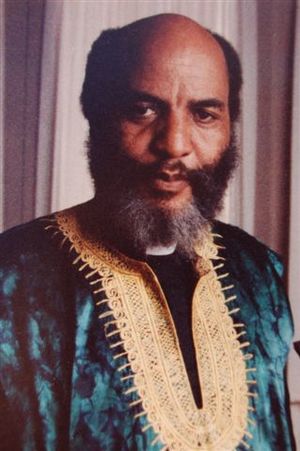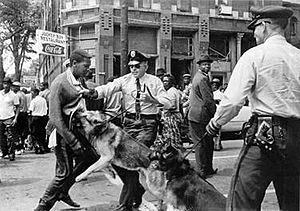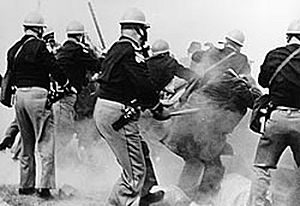James Bevel facts for kids
Quick facts for kids
James Bevel
|
|
|---|---|

Bevel in 1987
|
|
| Born |
James Luther Bevel
October 19, 1936 |
| Died | December 19, 2008 (aged 72) |
| Occupation | Minister and civil rights activist, SCLC Director of Direct Action |
| Known for | Strategist of the Birmingham Children's Crusade, Selma voting rights movement, Selma to Montgomery march, and Chicago Open Housing Movement during the Civil Rights Movement |
| Spouse(s) |
Helen Bevel Erica Henry |
| Children | 16 |
James Luther Bevel (born October 19, 1936 – died December 19, 2008) was a minister and an important leader in the Civil Rights Movement during the 1960s in the United States. He was a key member of the Southern Christian Leadership Conference (SCLC).
Bevel helped plan and lead many major events of the Civil Rights Movement. These included the 1963 Birmingham Children's Crusade, the 1965 Selma voting rights movement, and the 1966 Chicago open housing movement. He also suggested the idea for the March on Washington in 1963. His plans for the Selma to Montgomery marches helped lead to the Voting Rights Act of 1965. This law made it easier for African Americans to vote.
Before joining SCLC, Bevel worked with the Nashville Student Movement. This group organized the 1960 Nashville Lunch-Counter Sit-Ins. They also helped continue the 1961 Freedom Rides after attacks. Bevel was known as a great planner and leader in the Civil Rights Movement. Many say he worked closely with Martin Luther King Jr. to create the strategies that led to important laws and social changes.
Contents
Early Life and Education (1936-1961)
James Bevel was born in 1936 in Itta Bena, Mississippi. He was one of 17 children. He grew up in the countryside of LeFlore County and in Cleveland, Ohio. As a young person, he worked on a cotton farm and later in a steel mill. He went to schools where Black students were kept separate from white students. After high school, he joined the U.S. Navy for a time.
Bevel felt called to become a minister. From 1957 to 1961, he studied at the American Baptist Theological Seminary in Nashville, Tennessee. He became a Baptist preacher. While at seminary, Bevel read books by Leo Tolstoy and Mahatma Gandhi. These books taught him about nonviolent ways to bring about change. He also attended workshops on nonviolence led by James Lawson and Myles Horton.
Leading Important Movements (1960s)
Nashville Student Movement (1960-61)
In 1960, Bevel joined other students like Bernard Lafayette, John Lewis, and Diane Nash in the Nashville Sit-In Movement. Their goal was to end segregation at lunch counters in Nashville. After this success, students from across the South formed the Student Nonviolent Coordinating Committee (SNCC). Bevel also led the 1961 Nashville Open Theater Movement, which helped end segregation in theaters.
In 1961, the Congress of Racial Equality (CORE) started the Freedom Rides. These rides challenged laws that kept bus stations separate for Black and white people. When the Freedom Riders were attacked, Diane Nash urged students to continue the rides. Bevel helped choose the student teams for the buses. He and others were arrested in Jackson, Mississippi, for trying to use the white-only waiting rooms. The Freedom Rides showed the country the violence used to keep Jim Crow segregation in the South.
While in jail, Bevel and Bernard Lafayette started the Mississippi Voting Rights Movement. They worked to help Black people register to vote. This work later grew into Freedom Summer in 1964.
Bevel and King Work Together (1962)
In 1962, Bevel met with Martin Luther King Jr. in Atlanta. They agreed to work together as equals on projects for the Southern Christian Leadership Conference (SCLC). Their goals were to end segregation, get voting rights for all, and make sure all children had good education.
Soon after, Bevel became SCLC's Director of Direct Action and Nonviolent Education. This meant he was in charge of planning and teaching about nonviolent protests.
Birmingham Children's Crusade (1963)

In 1963, SCLC went to Birmingham, Alabama, to help end segregation in stores and jobs. Adults found it hard to protest because they would lose their jobs. Bevel suggested recruiting students for the campaign. King was unsure at first, but he agreed.
Bevel spent weeks teaching students about nonviolence. They met at Birmingham's 16th Street Baptist Church. Bevel sent students, 50 at a time, to peacefully walk to City Hall. On the first day, almost 1,000 students were arrested. The next day, when more students marched, City Commissioner Bull Connor ordered police to use German Shepherd dogs and strong fire hoses on them. News and photos of this violence against schoolchildren shocked people around the world.
Talking with President Kennedy and the March on Washington
During the Birmingham Children's Crusade, President John F. Kennedy asked King to stop using children in the protests. Bevel said he would organize the children to march all the way to Washington D.C. to talk to the President. When the Kennedy administration heard this, they agreed to work with SCLC leaders on a new civil rights law. Bevel then called off the children's march.
On August 28, 1963, SCLC took part in the March on Washington for Jobs and Freedom. This huge event was organized by A. Philip Randolph and Bayard Rustin. Bevel and Nash watched Dr. King's famous "I Have a Dream" speech on TV.
Selma Voting Rights Movement (1965)

In September 1963, Bevel and his wife, Diane Nash, started the Alabama Voting Rights Project. They wanted to help Black people in Alabama register to vote. At that time, many laws made it very hard for Black people to vote, like requiring them to pay special taxes or pass unfair tests.
Bevel, Nash, and others worked with local groups. They invited King and other SCLC leaders to Selma, Alabama, to help. Together, they became the Selma Voting Rights Movement. They held regular marches to the courthouse. On February 16, 1965, a young man named Jimmie Lee Jackson was shot and killed by police during a protest.
Bevel was very upset by Jackson's death. He suggested a march from Selma to Montgomery, the state capital. The first march was attacked by police on the Edmund Pettus Bridge. This event became known as "Bloody Sunday."
After this, many people from across the country came to Selma to join the march. With federal protection, thousands of marchers completed the 54-mile journey to Montgomery. This march and the violence against protesters helped convince President Lyndon B. Johnson to pass the Voting Rights Act of 1965. This law helped protect the right to vote for all Americans.
In 1965, SCLC gave its highest award, the Rosa Parks Award, to James Bevel and Diane Nash for their important work.
Chicago Freedom Movement (1965-1966) and Anti-Vietnam War Movement (1967)
In 1966, Bevel chose Chicago for SCLC's next big campaign. He worked to improve housing for people living in poor areas. He organized the Chicago open housing movement. This movement worked to end unfair housing practices that kept neighborhoods segregated.
Later, Bevel became a leader in the movement against the Vietnam War. He helped convince Martin Luther King Jr. to support the anti-war movement. Bevel organized a large march in New York City on April 15, 1967, from Central Park to the United Nations Building. This was one of the biggest anti-war protests in American history at that time.
King's Death (April 4, 1968)
Bevel was at the Lorraine Motel in Memphis when Martin Luther King Jr. was killed on April 4, 1968. He was deeply affected by this event.
Marriage and Family
In 1961, Bevel married fellow activist Diane Nash. They worked together on civil rights issues and had a daughter and a son. They later divorced. He married two other women in the years that followed.
Cultural Impact
The actor and rapper Common played James Bevel in the 2014 movie Selma.
See also
- List of civil rights leaders
- List of peace activists
- Pacifism
- Timeline of the civil rights movement
Images for kids
 | John T. Biggers |
 | Thomas Blackshear |
 | Mark Bradford |
 | Beverly Buchanan |




